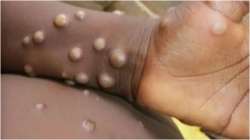What is Monkeypox? Know how it spreads, symptoms and treatment
Officials have warned that close contact with an infected person can lead to the spread of monkeypox virus. Additionally, there is no cure for it and the symptoms die down after running a course of three weeks.

The NHS defines monkeypox as a rare viral infection. A person in England has been diagnosed with the rare monkeypox virus, the UK Health Security Agency (UKHSA) has confirmed. This has led to a lot of curiosity about this infection. According to the health agency, the UK patient who is suffering from monkeypox had recently traveled to Nigeria, where he is believed to have caught the virus before coming to the UK. Importantly the health officials said the monkeypox virus does not spread easily between people, thus the risk to the public was very low.
Read: Excess salt in body can lead to malfunctioning of the kidneys. Know what expert says
Let us know more about the monkeypox infection.
What is Monkeypox?
According to the US Centers for Disease Control and Prevention (CDC), Monkeypox virus belongs to the Orthopoxvirus genus in the family Poxviridae. The Orthopoxvirus genus also includes variola virus (which causes smallpox), vaccinia virus (used in the smallpox vaccine), and cowpox virus.
Read: What is brain aneurysm? The condition affecting Chinese President Xi Jinpin
What is the carrier of Monkeypox?
While the natural reservoir of monkeypox remains unknown, African rodents and non-human primates (like monkeys) may harbour the virus and infect people, the CDC said.
First case of Monkeypox
Monkeypox was first discovered in 1958 when two outbreaks of a pox-like disease occurred in colonies of monkeys kept for research, hence the name monkeypox. The first human case of monkeypox was recorded in 1970 in the Democratic Republic of the Congo (DRC) during a period of intensified effort to eliminate smallpox. Since then, monkeypox has been reported in people in several other central and western African countries. Outside Africa cases have been detected in the US, Israel, Singapore. The UK first recorded a human case in 2018, and since then a handful of cases have been confirmed by health authorities.
Symptoms of monkeypox
Initial symptoms of monkeypox include fever, headache, muscle aches, backache, swollen lymph nodes, chills and exhaustion. A rash can develop, often beginning on the face, then spreading to other parts of the body. The rash changes and goes through different stages before finally forming a scab, which later falls off.
How monkeypox spreads?
Officials have warned that close contact with an infected person can lead to spread. The virus can enter the body through broken skin, the respiratory tract or through the eyes, nose or mouth.
Treatment of monkeypox
There is no proven treatment against the monkeypox virus. Symptomatic care with fluids and antipyretics is helpful for this disease. Monkeypox takes 2-4 weeks to run its entire duration of symptoms. The fatality rate is close to 10%, as per a Hindustan Times report.
(With IANS inputs)